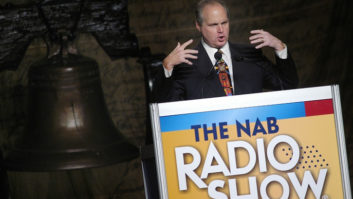In a Training Program for Radio Bosses, Holtom Teaches the People Perspective
A fresh outlook is crucial for any manager navigating the rapidly changing opportunities and obstacles in today’s radio environment.
For Georgetown University Professor Brooks Holtom, the right outlook is also a look inward. Radio is a people business. By creating opportunities for employees to flourish, organizations flourish too.
Holtom has created “The Power Game” and “Managing the Politics of Relationships” for the NAB’s Executive Development Program for Radio Broadcasters ( www.nab.org/radio/seminar), a classroom-type training seminar that takes place each summer and for which NAB members pay about $1,800.
The EDP’s curriculum is designed to give managers an opportunity to sharpen skills and gain new perspectives; but Holtom’s piece is more experiential.
Over the past three years, he has guided radio managers through a role-playing game to come to a better understanding of human dynamics at work within their organizations. While he believes that the best way for radio managers to take these lessons to heart is by participating, he offered a few pointers for those who haven’t had the opportunity.
‘Underling’ view
“The key is for managers to stay sensitized about what it’s like to work in any and all aspects of their organizations,” said Holtom. “For most, it’s been a long time since they knew firsthand what it’s like to be at the entry-level or talent side of the business. But knowing what drives people wherever they are is essential.”
Holtom’s “game” makes explicit the power relations that exist within hierarchical organizations.
The way the game works is simple. Start with a classroom full of managers and divide them into three groups with different levels of power in a hypothetical organization. Each participant antes up a $10 stake in the enterprise. The money serves as a symbol of the organization’s resources. Working out how it gets directed is the prime activity.
Though all players put up equal stakes, control of resources is not shared equally. The top group consists of 10 percent of the participants but controls two-thirds of the resources. The middle- and low-power groups divide up the rest.
For managers used to seeing things from the top, being placed at the bottom can raise awareness.
Even though not everyone can be on top, that doesn’t mean that those working under need to feel out of the loop.
“Most senior managers haven’t been in the role of underling for a long time. What they see in the role-play is the need for clear and accurate communications so that no one feels they’re working in the dark,” Holtom says.
“Wherever you are in an organization, you want to see how you contribute to the whole. You need to feel connected to the mission or else you feel exploited.”
Perceptions
Observing radio managers at play with this “game” over the years, Holtom has seen various groups arrive at much different approaches to managing power relations. Some have directed the bulk of resources into the pockets of top management. Others have directed it to charity.
The specific outcome isn’t so telling as the process. In one session, the signature action of the organization was renaming the low-power group, which made up the bulk of the participants, to “the large group.”
The lesson in this is to understand the power of perceptions. Creating the impression that everyone is a “player” fosters employee engagement. Though there is a difference between actual and such perceived power, employees who feel they are stakeholders far outperform those burdened by a sense of disenfranchisement.
Seeing radio in terms of larger business principles has value, he says. For all of radio’s idiosyncrasies, the fundamentals that apply throughout industry hold true in ours. Time and again, Holtom says, he has seen how human dynamics trump industry differences.
The bottom line? Attractive workplaces that draw in and retain excellent employees tend to be managed by people who share credit and are not consumed by maintaining power. Productive leadership operates by effectively communicating the organization’s vision and mission and providing everyone the opportunity to engage in the common enterprise to the best of their abilities.
This, he argues, is the cornerstone to building and maintaining a thriving organization.
For Holtom, success in the seminars isn’t about providing an academic appreciation for the problems of radio management. “What we really want is to shake people up. We want them to be different, to be changed by the experience, when they get back to the office,” he said.











